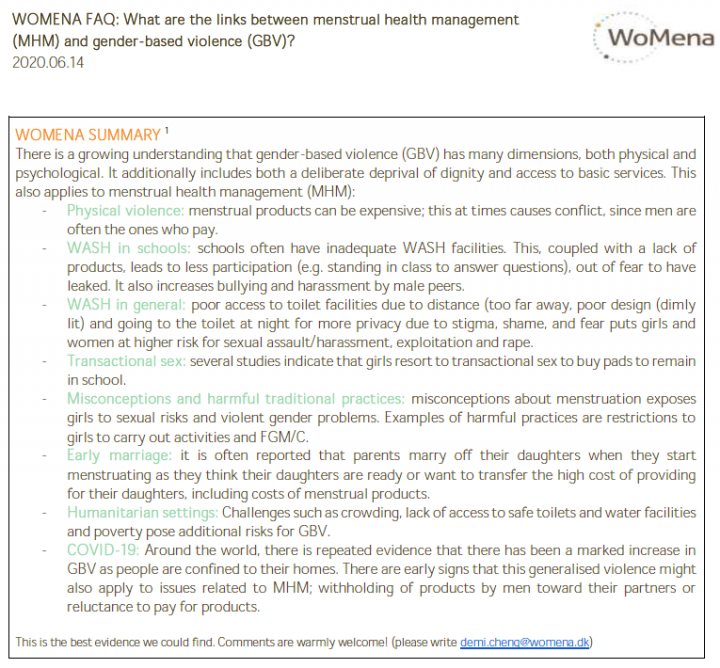
Published in: 2020
Pages: 7
Publisher:
WoMena
Author:
WoMena
Uploaded by:
Marianne Tellier
Partner profile:
WoMena
2759 Views
159 Downloads
WoMena SUMMARY [1]
There is a growing understanding that gender-based violence (GBV) has many dimensions, both physical and psychological. It additionally includes both a deliberate deprival of dignity and access to basic services. This also applies to menstrual health management (MHM):
Physical violence: menstrual products can be expensive; this at times causes conflict since men are often the ones who pay.
WASH in schools: schools often have inadequate WASH facilities. This, coupled with a lack of products, leads to less participation (e.g. standing in class to answer questions), out of fear to have leaked. It also increases bullying and harassment by male peers.
WASH in general: poor access to toilet facilities due to distance (too far away, poor design (dimly lit) and going to the toilet at night for more privacy due to stigma, shame, and fear put girls and women at higher risk for sexual assault/harassment, exploitation, and rape.
Transactional sex: several studies indicate that girls resort to transactional sex to buy pads to remain in school.
Misconceptions and harmful traditional practices: misconceptions about menstruation exposes girls to sexual risks and violent gender problems. Examples of harmful practices are restrictions on girls to carry out activities and FGM/C.
Early marriage: it is often reported that parents marry off their daughters when they start menstruating as they think their daughters are ready or want to transfer the high cost of providing for their daughters, including the costs of menstrual products.
Humanitarian settings: Challenges such as crowding, lack of access to safe toilets and water facilities and poverty pose additional risks for GBV.
COVID-19: Around the world, there is repeated evidence that there has been a marked increase in GBV as people are confined to their homes. There are early signs that this generalized violence might also apply to issues related to MHM; withholding of products by men toward their partners or reluctance to pay for products.
This FAQ by WoMena explores the link between GBV and MHM. We write this FAQ while the COVID-19 pandemic is raging, and therefore a section is included about how lockdown measures are likely linked to GBV and MHM, although there is still limited empirical evidence. In addition, the results of the rapid assessment about the impact of the pandemic on MHM among girls and women in Uganda will be briefly discussed.
Bibliographic information
WoMena (2020). What are the links between Menstrual Health Management & Gender-Base Violence?. WoMena
Filter tags
Educators English Menstrual Health and Hygiene (MHH) Sexual and gender-based violence














